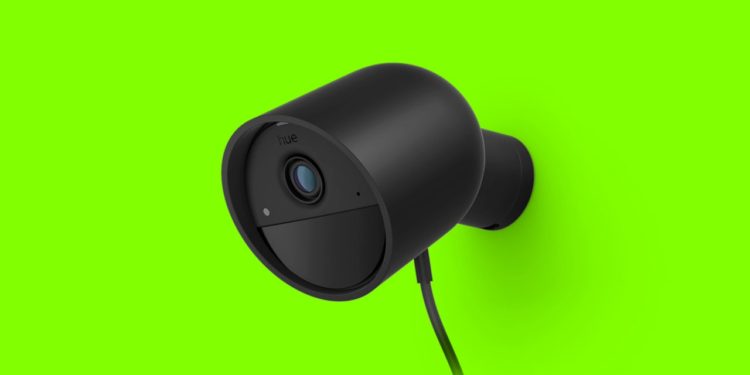By WIRED
With an established reputation for quality smart lighting, albeit at a hefty cost, Philips Hue is a well-known brand. A move into the saturated security market may seem incongruous, but there are reasons to buy a Philips Hue Secure camera. Trust, reliability, and seamless syncing with Hue lights will tempt some, but distinctly average specs, the need for a subscription, and the lack of HomeKit support make it a tough sell for others.
Closing in on a month with the new Philips Hue Secure wired camera, I am impressed by the performance and the tight integration into the existing Hue app. But the need for a Hue Bridge and a subscription to unlock the best features is off-putting, and there are many more affordable options in our best indoor and outdoor security camera guides.
Solid Design
Photograph: Philips
The Philips Hue Secure camera comes in black or white with a magnetic mount and a 3-meter (around 10-foot) power cable that slots into the bottom of the camera and is permanently attached to the power adapter at the other end. It looks like an oversize Google Nest Cam. It feels durable and scores an IP65 rating, which means you can use it outside, though the large power adapter won’t fit some outdoor sockets. There is a bigger, battery-powered, wireless Hue camera that is better suited to the outdoors, though it costs an extra $50 and we have not tested it yet.
I installed the Philips Hue Secure camera in my office and opted for the version with the desktop stand, which cost an extra $30. The strong magnetic mount makes it easy to adjust to your preferred angle and it slots into the weighted desk stand securely. There is also cable management on the underside, but I’m still not convinced the stand is worth the additional outlay.
A simple QR code scan had my camera up and running within a few minutes. This is a 1080p camera with a 141.2-degree field of view that lets you keep tabs on a wide area, though there is some fish-eye distortion. The footage was crisp and clear, and I found the camera coped quite well with mixed lighting and movement. There’s also solid night vision in black and white. Connectivity-wise, the camera supports Zigbee and both 2.4-GHz and 5-GHz Wi-Fi. I found it was relatively swift to load the livestream and there was virtually no lag.
Motion notifications were reliable and came through swiftly to my Pixel phone and iPhone 14 Pro. A handy still frame from each video gives you an idea of what the alert is about, so you can decide whether you need to review it. You can livestream and set blackout zones, and all video is end-to-end encrypted, so only you have access. If you have a Hue Bridge ($60) and Hue lights, you can set the camera to trigger them. For example, you might have an intruder trigger flashing red lights.
I had the camera in my office trigger the Hue lights in the room and was able to set them to different levels based on the time of day. It’s neat and works slightly better than a motion sensor, turning the lights off more swiftly when you leave. The Take Action button reveals options to swiftly call an emergency contact or 911, turn on bright lights to see better, and a slider to trigger the siren and flash your Hue lights. You can also tap the Talk button for two-way audio, which offers decent sound quality and virtually no lag, making it easy to carry on a conversation.
Slick Integration
To get the best from this camera you need the Hue Bridge and lights, and a subscription. You can either pay $4 a month or $40 a year for a basic plan that covers one camera, or you can pay $10 a month or $100 a year for up to 10 cameras. Both plans unlock video clip recording to the cloud (there’s no local storage option), activity zones, and AI-powered detection capable of identifying people, animals, packages, and vehicles. The Basic plan gives you 30 days of cloud storage and the Plus plan ups that to 60 days.







Discussion about this post